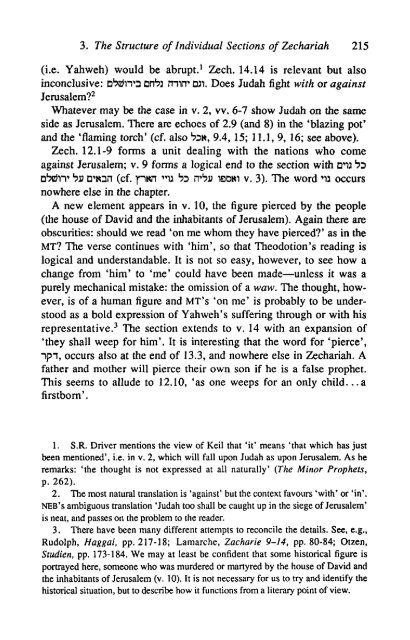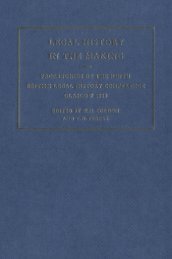- Page 2 and 3:
journal for the study of the old te
- Page 4 and 5:
Structure and the Book of Zechariah
- Page 6 and 7:
CONTENTS Preface 7 Table of Figures
- Page 8 and 9:
PREFACE This book was conceived in
- Page 10 and 11:
TABLE OF FIGURES 1. Patterns in the
- Page 12 and 13:
JBL JEOL JETS JNES JR JSOT JSS JTS
- Page 14 and 15:
INTRODUCTION This book has two mutu
- Page 16 and 17:
Introduction 15 studies are entirel
- Page 18 and 19:
Introduction 17 1. Small individual
- Page 20 and 21:
1. Investigating Structure 19 a uni
- Page 22 and 23:
1. Investigating Structure 21 in th
- Page 24 and 25:
Psalm 3 [Gibbs [Auffret Psalm 4 [Gi
- Page 26 and 27:
1. Investigating Structure 25 repet
- Page 28 and 29:
1. Investigating Structure 27 The a
- Page 30 and 31:
1. Investigating Structure 29 In de
- Page 32 and 33:
1. Investigating Structure 31 for e
- Page 34 and 35:
1. Investigating Structure 33 2. Th
- Page 36 and 37:
1. Investigating Structure 35 Schol
- Page 38 and 39:
1. Investigating Structure 37 shoul
- Page 40 and 41:
1. Investigating Structure 39 The f
- Page 42 and 43:
1. Investigating Structure 41 Jerem
- Page 44 and 45:
1. Investigating Structure 43 1. 2.
- Page 46 and 47:
1. Investigating Structure 45 The s
- Page 48 and 49:
1. Investigating Structure 47 scept
- Page 50 and 51:
1. Investigating Structure 49 the c
- Page 52 and 53:
1. Investigating Structure 51 Coven
- Page 54 and 55:
1. Investigating Structure 53 Theor
- Page 56 and 57:
1. Investigating Structure 55 a *7i
- Page 58 and 59:
1. Investigating Structure 57 surer
- Page 60 and 61:
1. Investigating Structure 59 3. We
- Page 62 and 63:
1. Investigating Structure 61 e. At
- Page 64 and 65:
2. Division of Zechariah 63 usually
- Page 66 and 67:
2. Division of Zechariah 65 2.1-4:
- Page 68 and 69:
2. Division of Zechariah 67 2.77: I
- Page 70 and 71:
2. Division of Zechariah 69 5.1-4:
- Page 72 and 73:
2. Division of Zechariah 71 peoples
- Page 74 and 75:
2. Division of Zechariah 73 prepare
- Page 76 and 77:
2. Division of Zechariah 75 10.Iff.
- Page 78 and 79:
2. Division of Zechariah 77 10.1-11
- Page 80 and 81:
Main investigation (computer result
- Page 82 and 83:
Verses 1 Word 1 ehn 1 2 ntf 3 3 DTT
- Page 84 and 85:
3. The Structure of Individual Sect
- Page 86 and 87:
3. The Structure of Individual Sect
- Page 88 and 89:
3. The Structure of Individual Sect
- Page 90 and 91:
3. The Structure of Individual Sect
- Page 92 and 93:
3. The Structure of Individual Sect
- Page 94 and 95:
3. The Structure of Individual Sect
- Page 96 and 97:
Verses Word 1 2 3 4 56 7 8 9 10 11
- Page 98 and 99:
3. The Structure of Individual Sect
- Page 100 and 101:
3. The Structure of Individual Sect
- Page 102 and 103:
3. The Structure of Individual Sect
- Page 104 and 105:
3. The Structure of Individual Sect
- Page 106 and 107:
3. The Structure of Individual Sect
- Page 108 and 109:
3. The Structure of Individual Sect
- Page 110 and 111:
3. The Structure of Individual Sect
- Page 112 and 113:
3. The Structure of Individual Sect
- Page 114 and 115:
3. The Structure of Individual Sect
- Page 116 and 117:
3. The Structure of Individual Sect
- Page 118 and 119:
3. The Structure of Individual Sect
- Page 120 and 121:
3. The Structure of Individual Sect
- Page 122 and 123:
3. The Structure of Individual Sect
- Page 124 and 125:
3. The Structure of Individual Sect
- Page 126 and 127:
3. The Structure of Individual Sect
- Page 128 and 129:
Verses 1 2 3 4 Word MR (2) r» ( 3
- Page 130 and 131:
3. The Structure of Individual Sect
- Page 132 and 133:
3. The Structure of Individual Sect
- Page 134 and 135:
3. The Structure of Individual Sect
- Page 136 and 137:
3. The Structure of Individual Sect
- Page 138 and 139:
3. The Structure of Individual Sect
- Page 140 and 141:
3. The Structure of Individual Sect
- Page 142 and 143:
3. The Structure of Individual Sect
- Page 144 and 145:
3. The Structure of Individual Sect
- Page 146 and 147:
3. The Structure of Individual Sect
- Page 148 and 149:
3. The Structure of Individual Sect
- Page 150 and 151:
3. The Structure of Individual Sect
- Page 152 and 153:
3. The Structure of Individual Sect
- Page 154 and 155:
3. The Structure of Individual Sect
- Page 156 and 157:
3. The Structure of Individual Sect
- Page 158 and 159:
3. The Structure of Individual Sect
- Page 160 and 161:
3. The Structure of Individual Sect
- Page 162 and 163:
Chapter 7 Verses Word 1 3 rfrt 2 1
- Page 164 and 165:
3. The Structure of Individual Sect
- Page 166 and 167: 3. The Structure of Individual Sect
- Page 168 and 169: 3. The Structure of Individual Sect
- Page 170 and 171: 3. The Structure of Individual Sect
- Page 172 and 173: 3. The Structure of Individual Sect
- Page 174 and 175: 3. The Structure of Individual Sect
- Page 176 and 177: 3. The Structure of Individual Sect
- Page 178 and 179: 3. The Structure of Individual Sect
- Page 180 and 181: 3. The Structure of Individual Sect
- Page 182 and 183: 3. The Structure of Individual Sect
- Page 184 and 185: 3. The Structure of Individual Sect
- Page 186 and 187: 3. The Structure of Individual Sect
- Page 188 and 189: 3. The Structure of Individual Sect
- Page 190 and 191: 3. The Structure of Individual Sect
- Page 192 and 193: 3. The Structure of Individual Sect
- Page 194 and 195: Chapter 9 Verses 1 3 5 7 9 11 13 15
- Page 196 and 197: 3. The Structure of Individual Sect
- Page 198 and 199: 3. The Structure of Individual Sect
- Page 200 and 201: 3. The Structure of Individual Sect
- Page 202 and 203: 3. The Structure of Individual Sect
- Page 204 and 205: Chapter 11 Verses Word 4 5 6 7 8 *T
- Page 206 and 207: 3. The Structure of Individual Sect
- Page 208 and 209: 3. The Structure of Individual Sect
- Page 210 and 211: 3. The Structure of Individual Sect
- Page 212 and 213: Chapter 12 13 Verses Word •on nvr
- Page 214 and 215: 3. The Structure of Individual Sect
- Page 218 and 219: 3. The Structure of Individual Sect
- Page 220 and 221: 3. The Structure of Individual Sect
- Page 222 and 223: 3. The Structure of Individual Sect
- Page 224 and 225: 3. The Structure of Individual Sect
- Page 226 and 227: Verses 1 Word WHOP 2 ta 3 dT) 7 TDK
- Page 228 and 229: 3. The Structure of Individual Sect
- Page 230 and 231: 3. The Structure of Individual Sect
- Page 232 and 233: 3. The Structure of Individual Sect
- Page 234 and 235: 3. The Structure of Individual Sect
- Page 236 and 237: 3. The Structure of Individual Sect
- Page 238 and 239: 3. The Structure of Individual Sect
- Page 240 and 241: 4. Connections Between Sections ofZ
- Page 242 and 243: 4. Connections Between Sections ofZ
- Page 244 and 245: 4. Connections Between Sections ofZ
- Page 246 and 247: 4. Connections Between Sections ofZ
- Page 248 and 249: 4. Connections Between Sections ofZ
- Page 250 and 251: 4. Connections Between Sections ofZ
- Page 252 and 253: 4. Connections Between Sections ofZ
- Page 254 and 255: 4. Connections Between Sections ofZ
- Page 256 and 257: 4. Connections Between Sections ofZ
- Page 258 and 259: 4. Connections Between Sections ofZ
- Page 260 and 261: 4. Connections Between Sections ofZ
- Page 262 and 263: 4. Connections Between Sections of
- Page 264 and 265: 4. Connections Between Sections ofZ
- Page 266 and 267:
4. Connections Between Sections ofZ
- Page 268 and 269:
4. Connections Between Sections ofZ
- Page 270 and 271:
4. Connections Between Sections ofZ
- Page 272 and 273:
4. Connections Between Sections ofZ
- Page 274 and 275:
4. Connections Between Sections ofZ
- Page 276 and 277:
4. Connections Between Sections ofZ
- Page 278 and 279:
4. Connections Between Sections ofZ
- Page 280 and 281:
5 6 7 8 9 10 11 12 13 14 4. Connect
- Page 282 and 283:
4. Connections Between Sections ofZ
- Page 284 and 285:
4. Connections Between Sections ofZ
- Page 286 and 287:
4. Connections Between Sections ofZ
- Page 288 and 289:
9 4. Connections Between Sections o
- Page 290 and 291:
4. Connections Between Sections ofZ
- Page 292 and 293:
4. Connections Between Sections ofZ
- Page 294 and 295:
4. Connections Between Sections ofZ
- Page 296 and 297:
4. Connections Between Sections ofZ
- Page 298 and 299:
4. Connections Between Sections ofZ
- Page 300 and 301:
4. Connections Between Sections ofZ
- Page 302 and 303:
4. Connections Between Sections ofZ
- Page 304 and 305:
5. Conclusions 303 However, in orde
- Page 306 and 307:
5. Conclusions 305 what the author/
- Page 308 and 309:
Bibliography 307 Good, R.M., 'Zecha
- Page 310 and 311:
Bibliography 309 Tidwell, N.L.A., '
- Page 312 and 313:
Bibliography 311 De Roche, M., 'Str
- Page 314 and 315:
Bibliography 313 Loader, J.A., Pola
- Page 316 and 317:
Bibliography 315 Veimes, G., Script
- Page 318 and 319:
30 34.22-23 46.3-4 58 68.10-11 71.2
- Page 320 and 321:
1-2 1 1.1-17 1.1-6 1.1 1.2-6 1.2 1.
- Page 322 and 323:
5.7 5.9 5.10 5.11 6-8 6 6.1-8 6.1 6
- Page 324 and 325:
9.11-17 9.11 9.12-10.10 9.12 9.13 9
- Page 326 and 327:
Matthew 21.1-11 27.10 180 210 Index
- Page 328 and 329:
Kikawada, I.M. 48 Kline, M.G. 275 K






